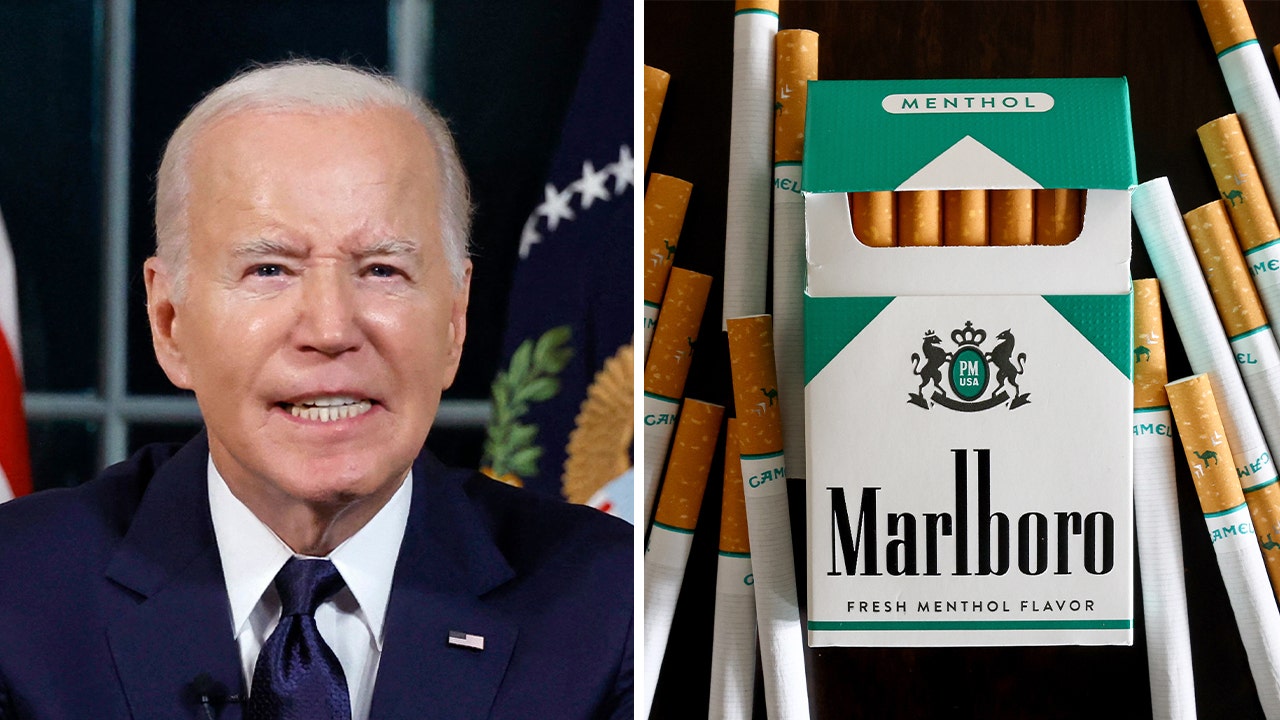
The Biden administration has decided to delay regulations banning menthol cigarettes following widespread opposition, with HHS Secretary Xavier Becerra stating that more conversations are needed. The proposed ban, initially introduced by the FDA, aimed to be a critical component of President Biden's Cancer Moonshot initiative, with arguments that it would reduce the appeal of cigarettes and have significant health benefits. The FDA had passed the regulations to the White House OMB for final approval after a long public comment period.

The Biden administration is set to finalize regulations targeting menthol cigarettes, facing opposition from small businesses, civil rights, law enforcement, and free market consumer groups. The FDA, after missing multiple target dates, remains committed to issuing these rules, submitted for final review by the Office of Management and Budget. The delays have caused concern among supporters of the ban, crucial for President Biden's Cancer Moonshot goals. The White House and FDA are proceeding with the rulemaking process, despite ongoing criticism and delays extending over seven months.

The Biden administration plans to impose tighter restrictions on U.S. firearms to prevent diversion to criminal groups, drug cartels, and others outside of America. These restrictions will include a 7% reduction in average annual U.S. firearm exports, with an emphasis on preventing firearms from being used for harmful purposes and harming U.S. national security. The new interim final rule will restrict exports to non-governmental users in 36 high-risk countries and increase scrutiny on transactions to ensure firearms aren't misused. Exemptions include export licenses for Ukraine and Israel among other close allies.

The U S Supreme Court heard its first test of state abortion bans post the Roe v Wade ruling, focusing on an Idaho abortion ban. Idaho law permits abortion only in case of maternal life risk, conflicting with federal law mandating emergency rooms to stabilize patients regardless, potentially impacting other states. The Biden administration has raised concerns about the conflict. The court's decision remains uncertain.

The FDA is considering banning methylene chloride, a chemical used in decaf coffee, due to its link to cancer in animals and humans. Major chains like Starbucks and Dunkin Donuts use this chemical in the decaffeination process. The Environmental Defense Fund started a petition for the ban, citing a 1958 ruling that bans additives causing cancer. The ban could affect the 10% of American adults who drink decaf daily. Alternative decaf methods like the Swiss method exist but are more expensive. Various studies have shown links between methylene chloride exposure and cancer in rodents and humans.

The Biden administration is moving forward with an expedited environmental review for a proposed lithium mine in Nevada, raising concerns among conservationists about the potential extinction of the endangered Nevada wildflower near the California border. Despite wildlife officials declaring the Nevada wildflower endangered at the site, federal land managers are progressing towards permitting the project, with the developer asserting that the mine and the flower can co-exist.

A small oral pouch called Zyn, containing nicotine powder and various flavors, is a rapidly growing segment of the tobacco industry, marketed by Philip Morris International to adult tobacco users. While not containing tobacco, it is treated as a tobacco product by U.S. regulators. Studies show lower harmful substances compared to traditional tobacco; however, concerns about potential underage use have sparked debates among health experts, parents, and politicians. Philip Morris aims to gain FDA authorization and potentially seek reduced-risk status for Zyn, though efficacy in helping smokers quit completely remains uncertain.

The Supreme Court will hear a case regarding Idaho's near-total ban on abortion conflicting with a federal law requiring Medicare-participating hospitals to provide emergency abortion care for mothers at serious health risk. The Biden administration sued Idaho, arguing the state law contradicts the federal Emergency Medical Treatment and Labor Act. After initial disagreements in lower courts, the Supreme Court will decide on the case by the end of June.

U.S. Food and Drug Administration v. Alliance for Hippocratic Medicine is a pending United States Supreme Court case to challenge the U.S. Food and Drug Administration (FDA)'s approval of mifepristone, a drug frequently used in medical abortion procedures. The plaintiffs, led by the Alliance for Hippocratic Medicine (AHM), argue that the FDA did not properly approve the use of the drug mifepristone for pregnancy termination under Federal Food, Drug, and Cosmetic Act regulations and ask for an injunction to withdraw the drug's approval, thus removing it from the market.District Judge Matthew J. Kacsmaryk issued a preliminary injunction suspending the approval of mifepristone on April 7, 2023; on appeal by the government to the Fifth Circuit, the Fifth Circuit partially reverted Kacsmaryk's injunction, allowing the drug's 2000 approval to stand, but putting on hold changes to the FDA's distribution rules on the drug that were put in place in 2016, including distribution by mail. A separate Washington federal district judge also issued on April 7, 2023, a separate injunction forcing the FDA to maintain the distribution of mifepristone in 16 states and the District of Columbia. On April 13, that judge issued another order, purporting to force FDA to maintain approval regardless of the Texas or Fifth Circuit ruling.The Supreme Court of the United States has accepted the appeal from the FDA and will hear the case in its 2023 term, with the Fifth's modified order stayed until resolution by the Supreme Court.

The Biden administration has finalized a rule protecting women's medical records from criminal investigations if they cross state lines to seek an abortion where it is legal. The new regulation aims to safeguard women in states where abortion is illegal from prosecution but may face legal challenges and criticism for not going far enough. The update to the Health Insurance Portability and Accountability Act of 1996 prohibits the disclosure of medical information by medical providers and insurers, preventing state officials in strict abortion rule states from accessing reproductive health care records.

Joe Biden's tenure as the 46th president of the United States began with his inauguration on January 20, 2021. Biden, a Democrat from Delaware who previously served as vice president for two terms under President Barack Obama, took office following his victory in the 2020 presidential election over Republican incumbent president Donald Trump. Upon his inauguration, he became the oldest president in American history, breaking the record set by his predecessor Trump. Biden entered office amid the COVID-19 pandemic, an economic crisis, and increased political polarization.On the first day of his presidency, Biden made an effort to revert President Trump's energy policy by restoring U.S. participation in the Paris Agreement and revoking the permit for the Keystone XL pipeline. He also halted funding for Trump's border wall, an expansion of the Mexican border wall. On his second day, he issued a series of executive orders to reduce the impact of COVID-19, including invoking the Defense Production Act of 1950, and set an early goal of achieving one hundred million COVID-19 vaccinations in the United States in his first 100 days.Biden signed into law the American Rescue Plan Act of 2021; a $1.9 trillion stimulus bill that temporarily established expanded unemployment insurance and sent $1,400 stimulus checks to most Americans in response to continued economic pressure from COVID-19. He signed the bipartisan Infrastructure Investment and Jobs Act; a ten-year plan brokered by Biden alongside Democrats and Republicans in Congress, to invest in American roads, bridges, public transit, ports and broadband access. Biden signed the Juneteenth National Independence Day Act, making Juneteenth a federal holiday in the United States. He appointed Ketanji Brown Jackson to the U.S. Supreme Court—the first Black woman to serve on the court. After The Supreme Court overturned Roe v. Wade, Biden took executive actions, such as the signing of Executive Order 14076, to preserve and protect women's health rights nationwide, against abortion bans in Republican led states. Biden proposed a significant expansion of the U.S. social safety net through the Build Back Better Act, but those efforts, along with voting rights legislation, failed in Congress. However, in August 2022, Biden signed the Inflation Reduction Act of 2022, a domestic appropriations bill that included some of the provisions of the Build Back Better Act after the entire bill failed to pass. It included significant federal investment in climate and domestic clean energy production, tax credits for solar panels, electric cars and other home energy programs as well as a three-year extension of Affordable Care Act subsidies. Biden signed the CHIPS and Science Act, bolstering the semiconductor and manufacturing industry, the Honoring our PACT Act, expanding health care for US veterans, and the Electoral Count Reform and Presidential Transition Improvement Act. In late 2022, Biden signed the Respect for Marriage Act, which repealed the Defense of Marriage Act and codified same-sex and interracial marriage in the United States. In response to the debt-ceiling crisis of 2023, Biden negotiated and signed the Fiscal Responsibility Act of 2023, which restrains federal spending for fiscal years 2024 and 2025, implements minor changes to SNAP and TANF, includes energy permitting reform, claws back some IRS funding and unspent money for COVID-19, and suspends the debt ceiling to January 1, 2025. Biden established the American Climate Corps and created the first ever White House Office of Gun Violence Prevention. On September 26, 2023, Joe Biden visited a United Auto Workers picket line during the 2023 United Auto Workers strike, making him the first US president to visit one.The foreign policy goal of the Biden administration is to restore the US to a "position of trusted leadership" among global democracies in order to address the challenges posed by Russia and China. In foreign policy, Biden completed the withdrawal of U.S. military forces from Afghanistan, declaring an end to nation-building efforts and shifting U.S. foreign policy toward strategic competition with China and, to a lesser extent, Russia. However, during the withdrawal, the Afghan government collapsed and the Taliban seized control, leading to Biden receiving bipartisan criticism. He responded to the Russian invasion of Ukraine by imposing sanctions on Russia as well as providing Ukraine with over $100 billion in combined military, economic, and humanitarian aid. Biden also approved a raid which led to the death of Abu Ibrahim al-Hashimi al-Qurashi, the leader of the Islamic State, and approved a drone strike which killed Ayman Al Zawahiri, leader of Al-Qaeda. Biden signed AUKUS, an international security alliance, together with Australia and the United Kingdom. Biden called for the expansion of NATO with the addition of Finland and Sweden, and rallied NATO allies in support of Ukraine. During the Israel–Hamas war, Biden condemned Hamas and other Palestinian militants as terrorism and announced American military support for Israel; Biden also showed his support and sympathy towards Palestinians affected by the war, sent humanitarian aid, and brokered a four-day temporary pause and hostage exchange.Biden began his term with over 50% approval ratings; however, these fell significantly after the withdrawal from Afghanistan and remained low as the country experienced high inflation and rising gas prices. His age and mental fitness have also been a subject of discussion.







CBS News

NY Post

Washington Post

ABC News

ABC News

ABC News

ABC News

Yahoo! News

Kelly Laco

https://apnews.com/author/zeke-miller

NPR

NBC

Fox News

Fox News

PANORA

PANORA

PANORA

PANORA

PANORA

PANORA

PANORA

Wikipedia

PANORA

Wikipedia